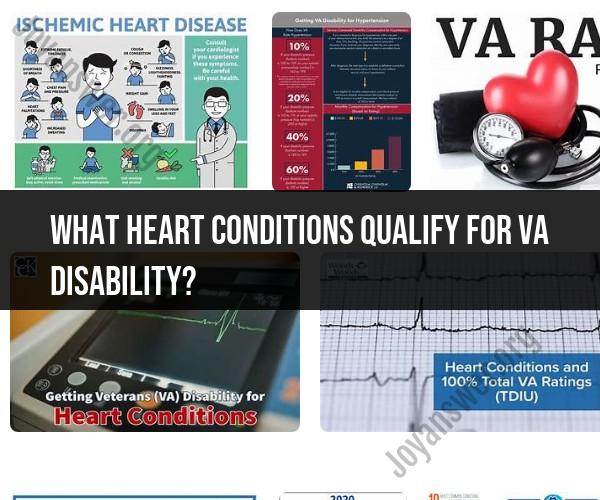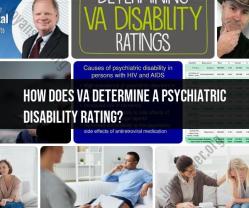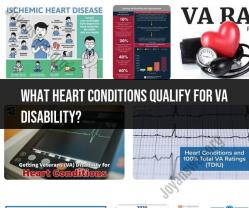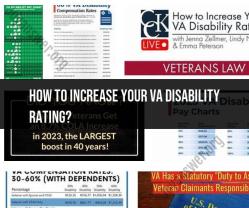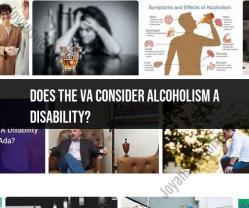What heart conditions qualify for VA disability?
The Department of Veterans Affairs (VA) provides disability benefits to veterans with service-connected heart conditions. To qualify for VA disability benefits, a veteran must meet certain eligibility criteria, and the heart condition must be related to their military service. Some of the heart conditions that may qualify for VA disability benefits include:
Ischemic Heart Disease (IHD): Also known as coronary artery disease (CAD), IHD is characterized by reduced blood flow to the heart muscle due to the narrowing of coronary arteries. Veterans exposed to certain herbicides during service in Vietnam or who have a service-connected risk factor for IHD may be eligible for benefits.
Congestive Heart Failure (CHF): CHF is a condition in which the heart is unable to pump blood effectively, leading to a buildup of fluid in the lungs and other parts of the body. Veterans with service-connected CHF may be eligible for benefits.
Hypertensive Heart Disease: Veterans with service-connected hypertension (high blood pressure) that results in heart disease may be eligible for disability benefits.
Arrhythmias: Certain arrhythmias (irregular heart rhythms) may qualify for benefits if they are related to military service or caused or aggravated by a service-connected disability.
Valvular Heart Disease: Heart conditions involving heart valve problems may be considered for benefits if they are related to military service.
Peripheral Artery Disease (PAD): PAD is a condition where blood flow to the limbs is reduced due to the narrowing of arteries. If PAD is service-connected or related to another service-connected disability, veterans may be eligible for benefits.
It's important to note that not all heart conditions automatically qualify for VA disability benefits. To establish eligibility, veterans must meet several criteria, including:
- Having a documented heart condition.
- Providing evidence of a service connection, which means demonstrating that the heart condition is related to or aggravated by military service.
- Demonstrating a specific level of disability based on medical evaluations and VA disability rating criteria.
Veterans seeking disability benefits for heart conditions should work with a Veterans Service Officer (VSO) or a representative from a veterans service organization to navigate the claims process. It's crucial to gather medical records, relevant evidence, and expert opinions to support the claim and ensure that all eligibility criteria are met. The VA will review the evidence and assign a disability rating based on the severity of the condition, which will determine the level of disability benefits the veteran may receive.
Heart Conditions and VA Disability: Qualifying for Benefits Explained
The VA recognizes a variety of heart conditions as disabilities, including:
- Coronary artery disease (CAD)
- Heart failure
- Arrhythmias
- Heart valve disease
- Cardiomyopathy
- Congenital heart disease
To qualify for VA disability benefits for a heart condition, you must meet the following criteria:
- Your heart condition must be service-connected. This means that it must have been caused or aggravated by your military service.
- Your heart condition must be rated at least 10%. This means that it must cause at least a 10% impairment in your ability to work and function in society.
Cardiac Health and VA Claims: Recognizing Heart Conditions for Benefits
If you have a heart condition, you may be eligible for VA disability benefits. However, it is important to note that not all heart conditions are service-connected, and not all heart conditions are rated at least 10%.
To determine whether your heart condition is service-connected and to rate your disability, the VA will consider the following factors:
- The severity of your heart condition
- The symptoms you are experiencing
- Your medical records
- Your military service records
The VA and Heart-Related Disabilities: Conditions Eligible for Disability Rating
The VA rates heart conditions on a scale of 0% to 100%, depending on the severity of the condition and the impact it has on your ability to work and function in society.
A rating of 10% means that your heart condition causes a slight impairment in your ability to work and function in society. A rating of 100% means that your heart condition is so severe that you are unable to work and function in society.
If you have a heart condition, you should contact the VA to discuss your eligibility for disability benefits. A VA representative can help you to file a claim and gather the necessary evidence.
Here are some tips for filing a successful VA disability claim for a heart condition:
- Gather as much medical evidence as possible to support your claim. This may include medical records, treatment records, and statements from your doctor.
- Be honest and upfront about your symptoms and how your heart condition has impacted your life.
- Work with a VA representative to file your claim and gather the necessary evidence.
- Be patient. The VA claims process can be slow, so it is important to be patient. If you have any questions or concerns, be sure to contact your VA representative.
If you are denied benefits, you can appeal the decision. You should also continue to seek treatment for your heart condition, even if your claim is denied.
